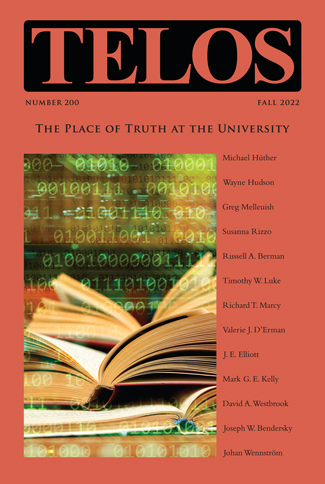In today’s episode of the Telos Press Podcast, David Pan talks with David A. Westbrook about his article “From the Ivory Tower to the Football Stadium: A Rueful Response to Michael Hüther,” from Telos 200 (Fall 2022). An excerpt of the article appears here. In their conversation they discuss Michael Hüther’s claim that the decline of truth at the university is due to moralization and economization; the traditional conception of the university that forms the background for Hüther’s critique and the function it played in society; how the role and function of the university today is different from that earlier conception and the reasons for this shift; how has university research moved from being a form of science to a form of investment; the political function of the university today; whether the ideals of merit and inclusion contradict each other; and how the university compares to a church. If your university has an online subscription to Telos, you can read the full article at the Telos Online website. For non-subscribers, learn how your university can begin a subscription to Telos at our library recommendation page. Print copies of Telos 200 are available for purchase in our online store.
|
In today’s episode of the Telos Press Podcast, David Pan talks with Michael Hüther about his article “Tired of Science?! Notes on the Relationship between University and Society,” from Telos 200 (Fall 2022). An excerpt of the article appears here. In their conversation they discuss what has become problematic in the relationship between science and truth and the relationship between science and values; how we should understand the role of myth in human society and why it continues to be important; how moralization responds to the dissatisfaction with science and the continuing relevance of myth; the dangers of moralization for the university; the driving forces behind the economization of the university as well as the consequences of this economization; how the German constitution establishes the social and political roles of the university; and how the university fulfills these roles today. If your university has an online subscription to Telos, you can read the full article at the Telos Online website. For non-subscribers, learn how your university can begin a subscription to Telos at our library recommendation page. Print copies of Telos 200 are available for purchase in our online store. In today’s episode of the Telos Press Podcast, David Pan talks with Greg Melleuish and Susanna Rizzo about their article “Universities: Truth, Reason, or Emotion?” from Telos 200 (Fall 2022). An excerpt of the article appears here. If your university has an online subscription to Telos, you can read the full article at the Telos Online website. For non-subscribers, learn how your university can begin a subscription to Telos at our library recommendation page. Print copies of Telos 200 are available for purchase in our online store. In today’s episode of the Telos Press Podcast, David Pan talks with J. E. Elliott about his article “Brand English and Its Discontents: Situating Truth and Value in the University Today,” from Telos 200 (Fall 2022). An excerpt of the article appears here. In their conversation they discuss how the pressure to commercialize university work has led to the creation of academic brands; how dissent has converged with commercialization at the university; why there is a conflict between meritocracy and inclusion, and how academic branding resolves it; how the peer review process has been undermined by academic branding; what a return to meritocratic values would look like; and why it is more appropriate to speak of truth-posits rather than truth as a goal of university work. If your university has an online subscription to Telos, you can read the full article at the Telos Online website. For non-subscribers, learn how your university can begin a subscription to Telos at our library recommendation page. Print copies of Telos 200 are available for purchase in our online store. In today’s episode of the Telos Press Podcast, David Pan talks with Richard T. Marcy and Valerie J. D’Erman about their article “The Sensemaking and Construction of Political Narratives in Academic Settings,” from Telos 200 (Fall 2022). An excerpt of the article appears here. In their conversation they discuss Max Weber’s distinction between political advocacy and university teaching, and how this distinction is relevant for analyzing territorial acknowledgments; why the framework of narrative sensemaking is appropriate for analyzing territorial acknowledgments; the way in which territorial acknowledgments have developed through a process of sensebreaking, sensegiving, and senselocking; how the territorial acknowledgment represents a kind of truth in academia; Weber’s distinction between neutrality and objectivity and his argument that all research inevitably has some sort of value orientation; and how that value orientation should function in the university, particularly with regard to the university’s civic function. If your university has an online subscription to Telos, you can read the full article at the Telos Online website. For non-subscribers, learn how your university can begin a subscription to Telos at our library recommendation page. Print copies of Telos 200 are available for purchase in our online store. Telos 200 (Fall 2022): The Place of Truth at the University is now available for purchase in our store. Individual subscriptions to Telos are also available in both print and online formats.
|
||||
|
Telos Press Publishing · PO Box 811 · Candor, NY 13743 · Phone: 212-228-6479 Privacy Policy · Data Protection Copyright © 2024 Telos Press Publishing · All Rights Reserved |
||||








